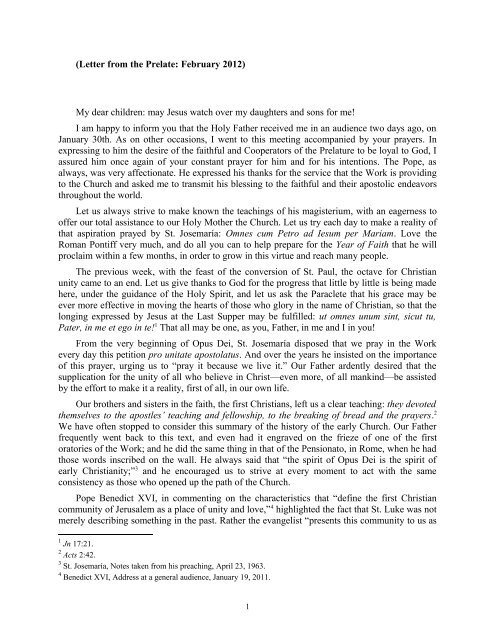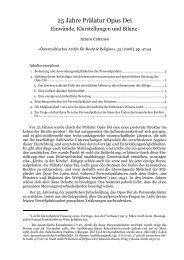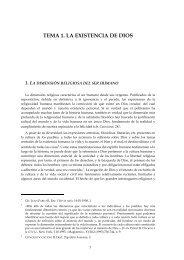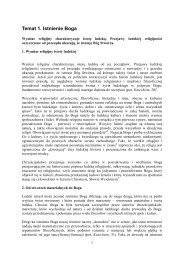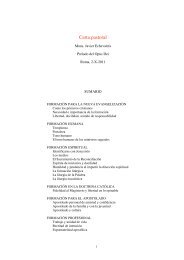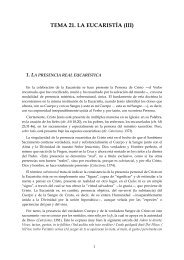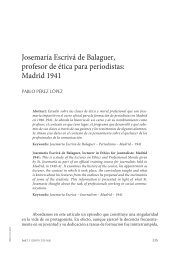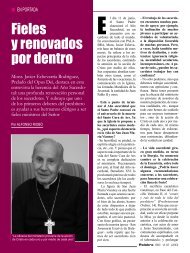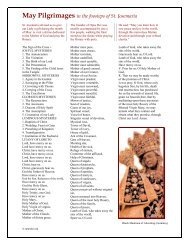Letter August 2011 - Opus Dei
Letter August 2011 - Opus Dei
Letter August 2011 - Opus Dei
You also want an ePaper? Increase the reach of your titles
YUMPU automatically turns print PDFs into web optimized ePapers that Google loves.
(<strong>Letter</strong> from the Prelate: February 2012)<br />
My dear children: may Jesus watch over my daughters and sons for me!<br />
I am happy to inform you that the Holy Father received me in an audience two days ago, on<br />
January 30th. As on other occasions, I went to this meeting accompanied by your prayers. In<br />
expressing to him the desire of the faithful and Cooperators of the Prelature to be loyal to God, I<br />
assured him once again of your constant prayer for him and for his intentions. The Pope, as<br />
always, was very affectionate. He expressed his thanks for the service that the Work is providing<br />
to the Church and asked me to transmit his blessing to the faithful and their apostolic endeavors<br />
throughout the world.<br />
Let us always strive to make known the teachings of his magisterium, with an eagerness to<br />
offer our total assistance to our Holy Mother the Church. Let us try each day to make a reality of<br />
that aspiration prayed by St. Josemaría: Omnes cum Petro ad Iesum per Mariam. Love the<br />
Roman Pontiff very much, and do all you can to help prepare for the Year of Faith that he will<br />
proclaim within a few months, in order to grow in this virtue and reach many people.<br />
The previous week, with the feast of the conversion of St. Paul, the octave for Christian<br />
unity came to an end. Let us give thanks to God for the progress that little by little is being made<br />
here, under the guidance of the Holy Spirit, and let us ask the Paraclete that his grace may be<br />
ever more effective in moving the hearts of those who glory in the name of Christian, so that the<br />
longing expressed by Jesus at the Last Supper may be fulfilled: ut omnes unum sint, sicut tu,<br />
Pater, in me et ego in te! 1 That all may be one, as you, Father, in me and I in you!<br />
From the very beginning of <strong>Opus</strong> <strong>Dei</strong>, St. Josemaría disposed that we pray in the Work<br />
every day this petition pro unitate apostolatus. And over the years he insisted on the importance<br />
of this prayer, urging us to “pray it because we live it.” Our Father ardently desired that the<br />
supplication for the unity of all who believe in Christ—even more, of all mankind—be assisted<br />
by the effort to make it a reality, first of all, in our own life.<br />
Our brothers and sisters in the faith, the first Christians, left us a clear teaching: they devoted<br />
themselves to the apostles’ teaching and fellowship, to the breaking of bread and the prayers. 2<br />
We have often stopped to consider this summary of the history of the early Church. Our Father<br />
frequently went back to this text, and even had it engraved on the frieze of one of the first<br />
oratories of the Work; and he did the same thing in that of the Pensionato, in Rome, when he had<br />
those words inscribed on the wall. He always said that “the spirit of <strong>Opus</strong> <strong>Dei</strong> is the spirit of<br />
early Christianity;” 3 and he encouraged us to strive at every moment to act with the same<br />
consistency as those who opened up the path of the Church.<br />
Pope Benedict XVI, in commenting on the characteristics that “define the first Christian<br />
community of Jerusalem as a place of unity and love,” 4 highlighted the fact that St. Luke was not<br />
merely describing something in the past. Rather the evangelist “presents this community to us as<br />
1 Jn 17:21.<br />
2 Acts 2:42.<br />
3 St. Josemaría, Notes taken from his preaching, April 23, 1963.<br />
4 Benedict XVI, Address at a general audience, January 19, <strong>2011</strong>.<br />
1
a model, as a norm for the Church today, since these four characteristics must always constitute<br />
the Church’s life.” 5 Indeed, fidelity to the teaching of the apostles, the union of hearts and souls,<br />
the celebration of the Holy Eucharist, and steadfastness in prayer are the pillars of authentic<br />
Christian life, essential for the Church to fully carry out her mission in the world.<br />
In this context of prayer for unity, I would like to refer specifically to the charity which<br />
united those women and men. As St. Luke also states, now the company of those who believed<br />
were of one heart and soul. 6<br />
The union of Christians is a gift of the Holy Spirit, which we have to beseech him for with<br />
steadfast prayer. But that prayer has to be seasoned with charity. Let us be convinced, as the<br />
Holy Father says, that “our quest for unity can be realistically conducted if the change takes<br />
place within us first of all and if we let God act, if we let ourselves be transformed into the image<br />
of Christ, if we enter into new life in Christ who is the true victory. The visible unity of all<br />
Christians is always a task that comes from on high, from God, a task that demands the humility<br />
of recognizing our weakness and of receiving the gift . . . The unity that comes from God<br />
therefore demands of us the daily commitment to open ourselves to each other in charity.” 7<br />
St. <strong>August</strong>ine taught that “pride engenders division, while charity is the mother of unity.” 8<br />
We have to be aware of the reality that each of us bears within the risk of disunity, because we<br />
all have the sad tendency to exalt our own ego, which is the greatest enemy of unity. Therefore<br />
one could not be a good instrument if one’s thoughts were centered selfishly on oneself, if one<br />
were carried away by pride, or failed to struggle to uproot personal defects. In contrast, sincere<br />
charity, lived without any pretense, as St. Paul recommends, 9 tightens the bonds that preserve<br />
and secure fraternity among people who are very different from one another, without restricting<br />
the legitimate diversity of ideas and ways of acting. Therefore, sincere petition for the unity of<br />
Christians has to be accompanied by a humility and charity shown in deeds. “Attaining this unity<br />
and preserving it,” said our Founder, “is a difficult task, which is nourished by acts of humility,<br />
self-renunciation, silence, knowing how to listen and to understand, being nobly interested in the<br />
good of one’s neighbor, knowing how to always forgive when necessary: how to love truly, with<br />
deeds.” 10<br />
For a Christian, one’s relationship with all those encountered on one’s path is never reduced<br />
to mere courtesy or good manners, but rather is an expression of the Love, with a capital L, that<br />
God himself pours into our hearts. Therefore charity, affection, is not merely a matter of feelings,<br />
although these play an important role in our actions, since we are not just spirits but men or<br />
women of flesh and blood. Nevertheless, we all need to purify our feelings: what perhaps begins<br />
as altruistic love runs the risk of becoming the product of one’s selfishness, the search for one’s<br />
own excellence, the disordered satisfaction of one’s ego.<br />
In the encyclical Deus Caritas Est, Pope Benedict XVI writes: “Sentiments come and go. A<br />
sentiment can be a marvelous first spark, but it is not the fullness of love.” 11 Our feelings need to<br />
5<br />
Ibid.<br />
6<br />
Acts 4:32.<br />
7<br />
Benedict XVI, Angelus address, January 22, 2012.<br />
8<br />
St. <strong>August</strong>ine, Sermon 46, 18 (PL 28, 280).<br />
9<br />
See 2 Cor 6:6.<br />
10<br />
St. Josemaría, Notes from his preaching, 1972.<br />
11<br />
Benedict XVI, Encyclical Deus Caritas Est, December 25, 2005, no. 17.<br />
2
e purified, brought to maturity through self-denial; only then will sentiment “become love in the<br />
full meaning of the word.” 12<br />
Our only model is Jesus Christ. Therefore Christian charity means loving as he loved us:<br />
even to the complete surrender of his life to the Father, out of love and for our salvation. He left<br />
us as a testament at the Last Supper: A new commandment I give to you, that you love one<br />
another; even as I have loved you, that you also love one another. By this all men will know that<br />
you are my disciples, if you have love for one another. 13 In those first Christian communities this<br />
new commandment was put into practice to such an extent that the pagans remarked in surprise:<br />
“See how they love one another!” 14<br />
True Christian charity, a participation in the Love that filled to overflowing the heart of the<br />
Incarnate Word, is imbued with sacrifice; it doesn’t seek its own affirmation, but the good of<br />
others. And it becomes a task that we can never view as finished: we have to learn to love,<br />
looking at the example of our Lord, of the Blessed Virgin, and of the saints who have loved God<br />
and their neighbor the most. Let us feel the responsibility of beginning and beginning again each<br />
day, many times a day, with small details of service and sacrifice for the others (and at times, in<br />
things of greater importance), which others perhaps will not realize, but which do not pass<br />
unnoticed to our Father God. Let us recall the insistence with which St. Josemaría directed to us<br />
those words of the prophet: discite benefacere, 15 learn to do good. Let us learn to finish well<br />
whatever we do.<br />
And by doing so, “love of neighbor is thus shown to be possible in the way proclaimed by<br />
the Bible, by Jesus. It consists in the very fact that, in God and with God, I love even the person<br />
whom I do not like or even know. This can only take place on the basis of an intimate encounter<br />
with God, an encounter which has become a communion of will, even affecting my feelings.<br />
Then I learn to look on this other person not simply with my eyes and my feelings, but from the<br />
perspective of Jesus Christ.” 16<br />
This way of behaving certainly requires (I don’t mind repeating it) the effort to leave aside<br />
our own ego, to forget about ourselves. Charity and humility are closely united; and their mature<br />
fruit is unity. “When we sincerely see ourselves as nothing; when we understand that, without<br />
God’s help, the weakest and most puny of creatures would be better than we are; when we see we<br />
are capable of every kind of error and every kind of abomination; when we realize we are sinners,<br />
even though we are earnestly struggling to turn our back on our many infidelities, how could we<br />
possibly think badly of others? Or how could we harbor fanaticism, intolerance or haughtiness in<br />
our hearts?<br />
“Humility leads us as it were by the hand to treat our neighbor in the best way possible, that is,<br />
being understanding towards everyone, living at peace with everyone, forgiving everyone; never<br />
creating divisions or barriers; and behaving—always!—as instruments that foster unity.” 17<br />
Charity, as every virtue, has to be lived with order. Therefore, without discriminating against<br />
12<br />
Ibid.<br />
13<br />
Jn 13:34-35.<br />
14<br />
Tertullian, Apologetics 39, 7 (CCL 1, 151).<br />
15<br />
Is 1:17.<br />
16<br />
Benedict XVI, Encyclical Deus Caritas Est, December 25, 2005, no. 18.<br />
17 St. Josemaría, Friends of God, no. 233.<br />
3
anyone, it needs to first of all be directed towards those we have around us: our own family,<br />
friends, colleagues at work, neighbors and acquaintances. Thus we help make the unity of the<br />
Church more solid and we assist—relying on prayer—in making the deeply desired union of all<br />
Christians a reality. How do we treat those whom God has placed close to us? What specific deeds<br />
of cheerful service every day do we provide to each one? Do we strive to ensure that at home, in<br />
the workplace, in our circle of friends, others sense the good aroma of Christ 18 of sincere<br />
friendship, of human affection imbued with God’s love?<br />
“The principal apostolate we Christians must carry out in the world,” wrote St. Josemaría,<br />
“and the best witness we can give of our faith, is to help bring about a climate of genuine charity<br />
within the Church. For who indeed could feel attracted to the Gospel if those who say they preach<br />
the Good News do not really love one another, but spend their time attacking one another,<br />
spreading slander, and quarrelling?” 19<br />
Our Lord asks us to carry out a sowing of understanding and forgiveness in every sector of<br />
society. He calls each Christian to this task, and expects it of all men and women. This sowing is<br />
possible if we are spurred by Christ’s charity, which knows how to make compatible differences of<br />
character, education and culture, in the unity of the Mystical Body, without any fissures. “The<br />
Apostle [St. Paul] is not condemning diversity. Each person has his own gift from God, some in<br />
one thing, some in another (see 1 Cor 7:7). These differences, however, must serve the good of the<br />
Church. I feel moved right now to ask our Lord (and if you wish you can join in my prayer) not to<br />
permit uncharitableness to sow its cockle in the Church. Charity is the salt of the Christian<br />
apostolate. If it should lose its taste, how can we come to the world and proclaim: Here is<br />
Christ?” 20<br />
In two weeks, on February 14th, we will commemorate in the Work the anniversary of the<br />
extension of the apostolic work to women, in 1930, and the foundation of the Priestly Society of<br />
the Holy Cross, in 1943. Our Father viewed that coinciding of dates, in different years, as a sign of<br />
Divine Providence, which wanted to strongly emphasize the unity of <strong>Opus</strong> <strong>Dei</strong>. Let us give thanks<br />
for this divine gift, which each and every one of us should foster and defend, first of all in our own<br />
lives, and also in our surroundings.<br />
Let us pray for all the pastors of the Church, so that all men and women, with Peter, the visible<br />
Head of the Mystical Body, may go to Jesus through Mary. Let us not cease to cry out to the Holy<br />
Spirit for the full incorporation of Christians and of all humanity in the unity of the Catholic<br />
Church, so that our Lord’s words may be fulfilled: I have other sheep, that are not of this fold; I<br />
must bring them also, and they will heed my voice. So there shall be one flock, one shepherd. 21<br />
I don’t want to end without an explicit remembrance of our beloved Don Alvaro, who<br />
celebrated his saint’s day on the 19th. From his response to God we can learn so much, including<br />
how to take great care of this supernatural family to which our Lord has called us—the Church, the<br />
Work—and to spend our lives happily in this effort, as did the first successor to St. Josemaría at the<br />
head of <strong>Opus</strong> <strong>Dei</strong>.<br />
As always, accompany me in my intentions; specifically, in a special way, pray for the sons of<br />
18 2 Cor 2:15.<br />
19 St. Josemaría, Friends of God, no. 226.<br />
20 Ibid., no. 234.<br />
21 Jn 10:16.<br />
4
mine, Associates of the Prelature, who will be ordained as deacons on the 18th.<br />
With all my affection, I bless you,<br />
Rome, February 1, 2012<br />
Your Father<br />
+ Javier<br />
5


